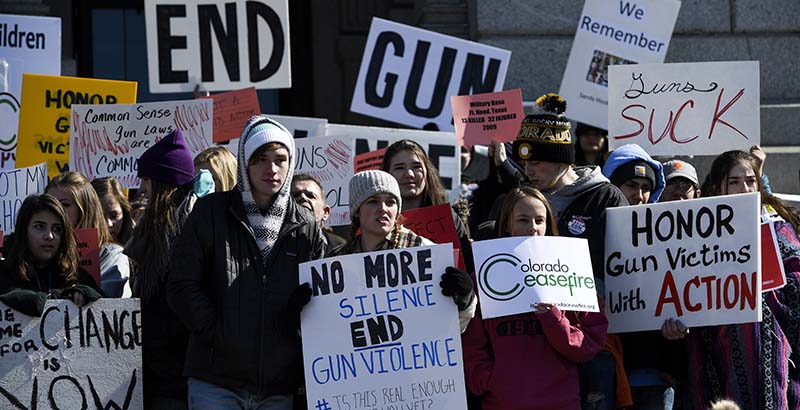Why Some Colleges Are Reassuring High Schoolers: If You Walk Out Wednesday, Don’t Worry — Peaceful Protests Won’t Hurt Admissions

On Wednesday, students at more than 2,500 high schools and colleges across the country are planning to walk out of their schools for 17 minutes both in protest of gun violence and in memory of young lives lost in the all-too-frequent school shootings of the past decade.
But some high school seniors have been worried: If their schools discipline them for walking out of class, will the colleges to which they’ve been accepted hear about it, and if so, will it affect their admissions status?
74 Explains—The student-led marches coming in March & April:
Many universities have been receiving these phone calls from concerned students in the lead-up to Wednesday’s walkout, prompting some colleges to assure incoming freshmen that peaceful protests — and any discipline that ensues — will not hurt their acceptances.
“The immediate need was to reassure students that [discipline] would not impact admissions status as long as it was — and, again, the optimum word here was — peaceful demonstrations,” Eric Jome, director of media relations at Illinois State University, told The 74. “We want people to stand up for what they believe in, and, again, going about that in a peaceful and civil manner.”
ISU was just one of several schools fielding these calls from students, Jome said. Many universities, from Texas State to the University of Connecticut, also took to Twitter to reassure applicants:
The concern was not unwarranted. Some colleges have caveats when they admit students, warning them against academic or behavioral infractions. For example, MIT’s acceptance letters read: “We have the right to revoke or defer your offer of admission if your conduct does not remain consistent with the high levels of integrity that you have shown in your application.”
But MIT was also one of the first universities to respond to reports that high schools were threatening students with suspensions if they left their classrooms. The Needville Independent School District in Texas, for example, warned that students could face three days of suspension if they walked out of school.
But in a powerful blog post, Stu Schmill, dean of admissions and student financial services at MIT, said civic engagement through peaceful protest is a critical component of learning. “We have long held that students should not make decisions based on what they think will get them into college, but instead based on values and interests that are important to them,” he wrote.
Schools have the right to punish students for missing classes but can’t discipline them more harshly than usual for exercising their right to free speech. “Whether schools can punish you for speaking out depends on when, where, and how you decide to express yourself,” the American Civil Liberties Union wrote in a resource for students contemplating walking out of school.
But not every college hangs admission on the disciplinary records of its prospective students.
“At the University of Washington, we do not ask for disciplinary history on our applications, and we do not consider disciplinary history in our admissions reviews,” Victor Balta, senior director of media relations at the University of Washington, wrote in an email to The 74. “Therefore, being disciplined for protesting would not hurt a UW applicant’s prospects.”
New York University has a similar policy it shared via social media.
Jome said he does not expect ISU’s policy will be burdensome to his admissions team, who may receive reports about disciplinary actions taken by high schools after the protest. But the need to reassure students of admission status in the face of protests is new territory for the university. “I don’t recall anything of this matter before, at least in recent years, of having to say anything like this,” Jome said.
The nationwide protest is being organized by Empower, the youth advocacy component of the Women’s March. Empower supports legislation that bans assault weapons, expands background checks, and prevents police brutality. It opposes legislation that arms teachers with guns.
Get stories like these delivered straight to your inbox. Sign up for The 74 Newsletter

;)
